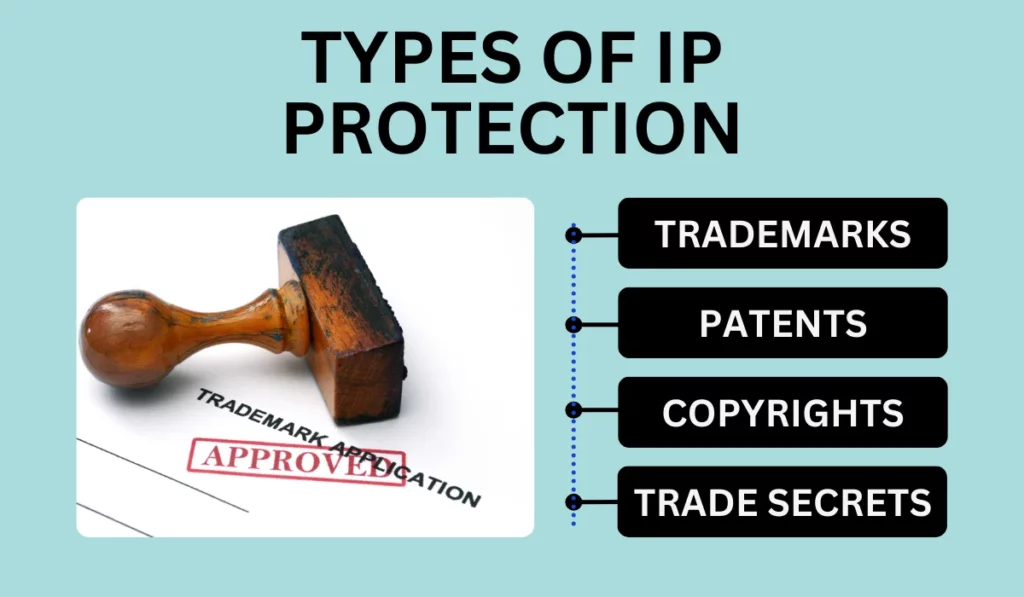Managed Service Provider
Strategies & Best Practices for IT Infrastructure Management
Mark Lukehart

Intellectual property (IP) is one of a business’s most valuable assets, yet it remains one of the most vulnerable. IP theft costs the US economy up to $600 billion annually, putting businesses of all sizes at risk—from stolen patents and trade secrets to counterfeit products. Neglecting IP protection leads to financial losses, legal disputes, and eroded market position.
As cyber threats and corporate espionage continue to rise, businesses must proactively safeguard their intellectual assets. Understanding the different types of intellectual property and leveraging the proper legal protections can help companies stay resilient in today’s fast-evolving marketplace.
Intellectual property refers to intangible assets that protect creative works, inventions, and proprietary information. It grants exclusive rights, allowing owners to benefit from their innovations.
The four primary types of IP—patents, trademarks, copyrights, and trade secrets—each provide legal safeguards for various business assets. In short, IP includes any information or processes specific to your firm that you don’t want others to be privy to.
Intellectual property protection drives economic growth by encouraging innovation and securing business value. It offers a competitive edge, allowing companies to protect their market position and maximize the potential of their intellectual assets. Technology, healthcare, and entertainment heavily depend on IP to prevent unauthorized use and maintain leadership.
Businesses of all sizes, from startups to global enterprises, rely on IP protection to safeguard their innovations and growth potential.
Entrepreneurs, inventors, and creative professionals like designers and artists depend on strong IP strategies to protect their work and establish long-term success.

Trademarks protect brand elements such as logos, names, and slogans, distinguishing products or services in the market. Registering a trademark with the United States Patent and Trademark Office (USPTO) ensures businesses can defend their brand identity and prevent infringement.
Patents grant exclusive rights to inventors, covering new inventions and product designs. There are different types, including design patents, which protect product aesthetics, and plant patents, which cover new varieties of plants.
The patent application process requires detailed documentation to secure protection under the U.S. patent system, ensuring businesses retain ownership over their innovations.
Copyrights safeguard creative works such as literature, music, and artistic works. Filing with the U.S. Copyright Office protects against copyright infringement and ensures legal recourse if unauthorized use occurs.
Copyright protection is crucial for businesses that create compilation materials, such as marketing content or software documentation.
Trade secrets protect confidential business information, such as proprietary formulas, manufacturing processes, and customer lists. Unlike other IP types, trade secrets do not require registration but rely on non-disclosure agreements (NDAs) and security measures to prevent unauthorized access. Strong intellectual property protection safeguards trade secrets and their commercial value.
Protecting intellectual property helps businesses stay ahead by preventing competitors from capitalizing on their innovations. Strong IP strategies support market expansion, attract investors, and enhance financial standing.
A proactive IP strategy minimizes the risk of costly lawsuits, regulatory penalties, and unauthorized use. It ensures compliance with intellectual property law and deters infringement attempts that could disrupt operations.
A well-managed IP portfolio enhances a company’s financial standing, making it more attractive to investors and partners. Leveraging patents, trademarks, and trade secrets can unlock new revenue streams through licensing and strategic collaborations.
Customers associate strong IP protection with authenticity and quality. Protecting intellectual property helps establish credibility, ensuring customers receive genuine products while reinforcing brand reputation and loyalty.
IP faces constant cyberattack threats like ransomware, phishing, and data breaches. Proactive measures—such as data encryption and multi-factor authentication—are essential to prevent financial and reputational damage
Proactive cybersecurity measures are crucial to IP protection. Implementing robust defense strategies helps protect valuable intellectual property rights from malicious actors.
Beyond external threats, unauthorized access from an organization can pose significant risks. Insider threats, accidental data leaks, and weak security controls can expose intellectual property, such as proprietary processes and industrial designs.
Strong access controls, employee education, and non-disclosure agreements are essential to safeguarding trade secrets and maintaining exclusive rights over critical business information. Preventing unauthorized access ensures the commercial value remains intact.
Intellectual property is constantly at risk—from cyber threats to internal vulnerabilities. Without the proper safeguards, businesses face financial loss, legal trouble, and reputational damage.
Parachute provides tailored security solutions to help protect your valuable assets and ensure compliance with evolving regulations.
IP theft is a growing threat that businesses can’t afford to overlook. At Parachute, we provide the expertise and tools to safeguard your most valuable assets.
Contact us today to safeguard your intellectual property and maintain your competitive edge.